Attached files
| file | filename |
|---|---|
| 8-K - FORM 8-K - ACI WORLDWIDE, INC. | d308830d8k.htm |
 March
2012 ACI Worldwide Investor Conferences
Exhibit 99.1 |
 Private Securities
Litigation Reform Act of 1995 Safe Harbor for Forward-Looking Statements
This presentation contains forward-looking statements based on current
expectations that involve a number of risks and uncertainties. The
forward-looking statements are made pursuant to safe harbor provisions
of the Private Securities Litigation Reform Act of 1995. A discussion of
these forward-looking statements and risk factors that may affect them is
set forth at the end of this presentation. The Company assumes no
obligation to update any forward-looking statement in this presentation,
except as required by law.
2 |
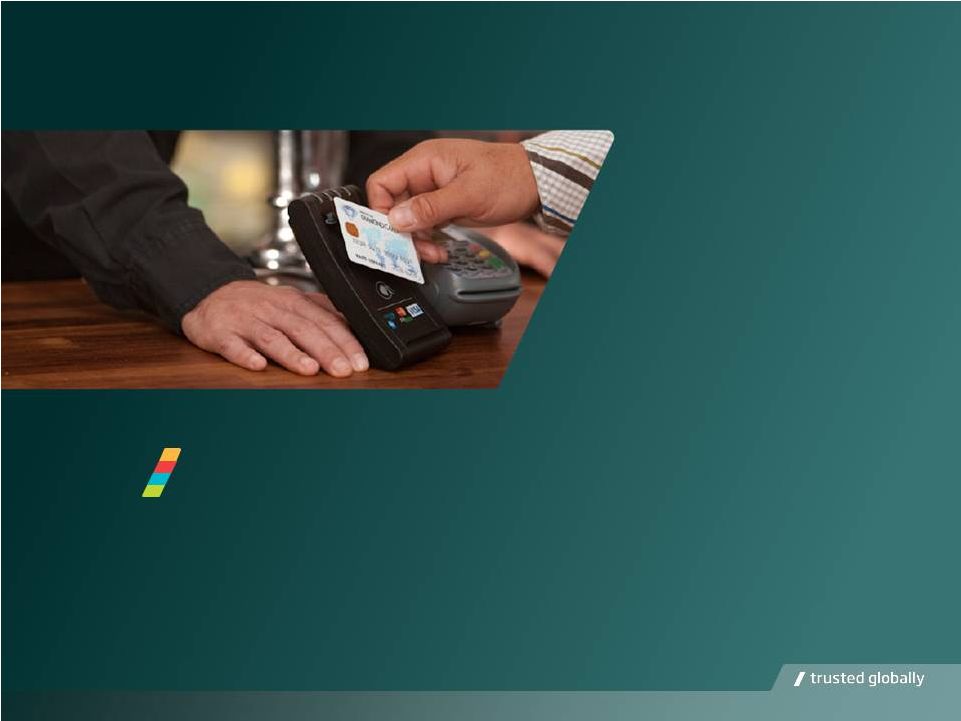 Business
overview 3 |
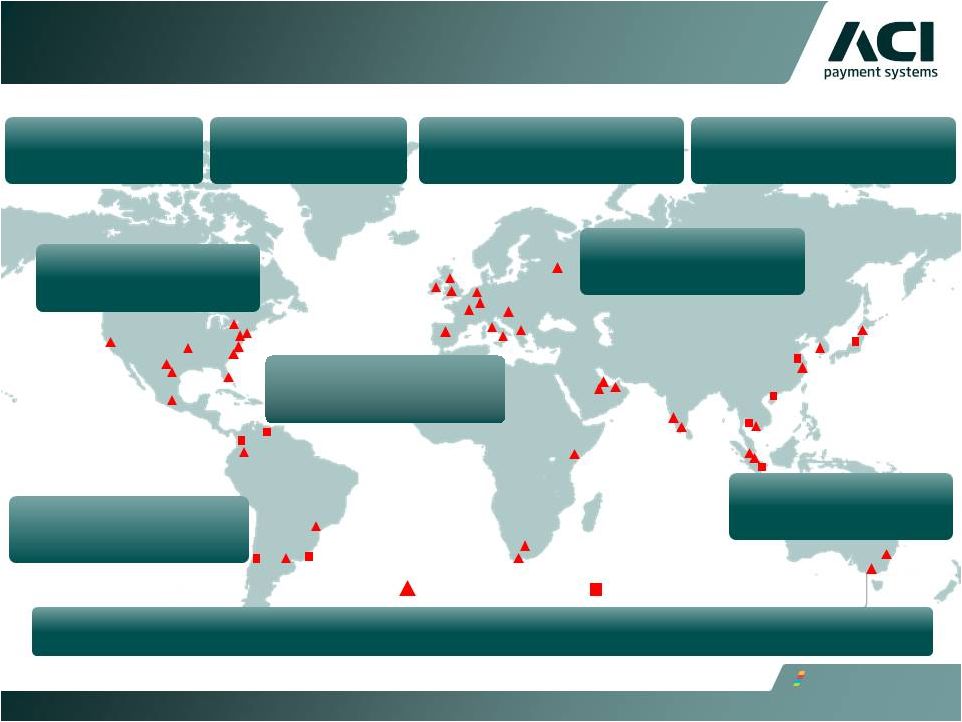 4
ACI Worldwide: A Global Payments Company
Regional Offices
Distributors/Sales Agents
AMERICAS
1150+ customers
EMEA
390+ customers
ASIA/PACIFIC
150+ customers
~ 1,700 customers in over 80 countries rely on ACI solutions
3500
employees
Rev CY2012 G
= $701M
Adj EBITDA CY 2012G
= $168M
60
month
backlog
as
of
Dec 2011 = $2.3B
Customers: ~ 170
processors globally
Customers: ~ 265
retailers globally |
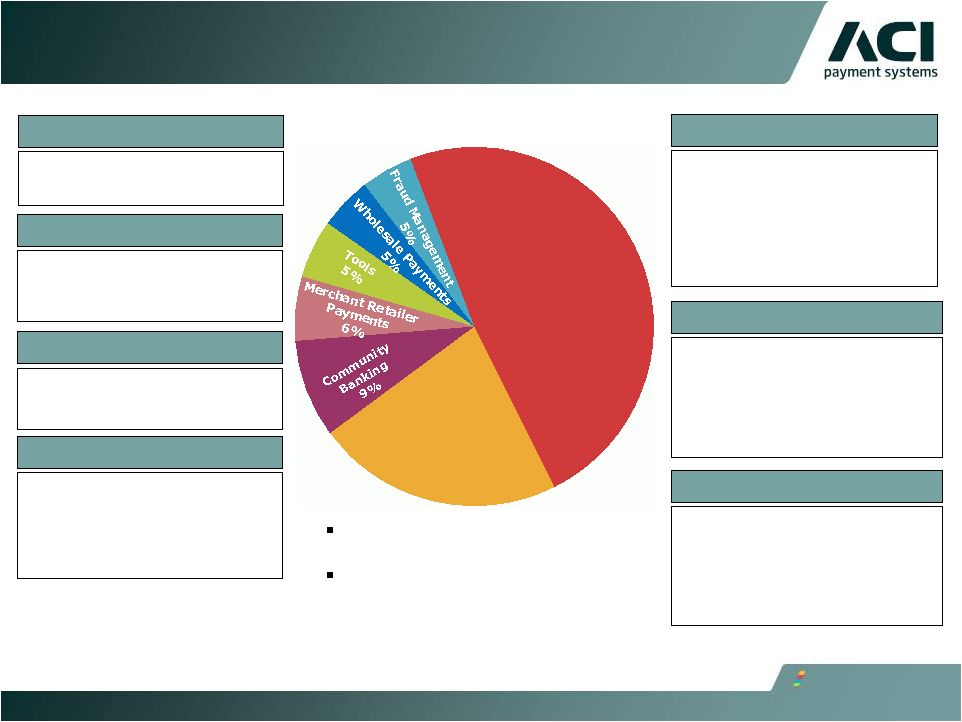 ACI is a Leading
Provider of Enterprise Payments and Transaction Banking Solutions
5
Retail Payments
48%
Online Banking
22%
•
Retail payments engines
•
Card and account management
•
Authentication, authorization,
acquiring, clearing and settlement
•
Single message format
•
Mobile payments
•
Sold to FIs and processors of all
sizes globally
Retail Payments
•
U.S. and int’l corporate online
banking and cash management
•
U.S. and Int’l branch systems
•
Trade finance
•
Mobile banking
•
In-house or hosted solution
•
Sold to Large FIs
Online Banking
•
U.S. business and consumer online
banking
•
U.S. branch system
•
Mobile banking
•
Hosted solutions
•
Sold to community FIs and credit
unions
Community Banking
•
U.S. and int’l merchant retail
payments engines
•
In-store integration
•
PCI compliance
•
Loyalty / stored value
•
Serves Retailers of all sizes
Merchant Retail Payments
•
Analytics
•
Payments Infrastructure
•
Testing tools
Tools
•
Wholesale payments engines
•
Transaction banking
•
Trade finance
•
Serves FIs globally
Wholesale Payments
•
Payments transaction fraud
•
Enterprise financial crimes
•
Case management
Fraud Management
ACI Product Family as % of Revenue
Rich set of Product Capabilities
Strong focus on Product
Development (R&D ~20% of
revenue) |
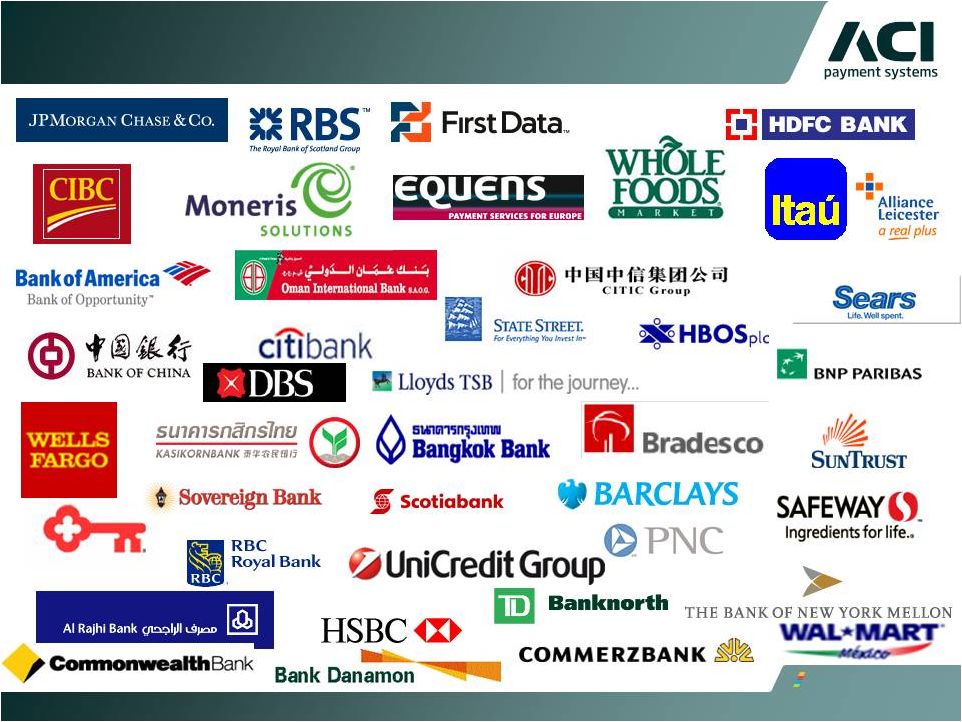 Our Customers Are
Top Global Banks, Processors and Retailers
6 |
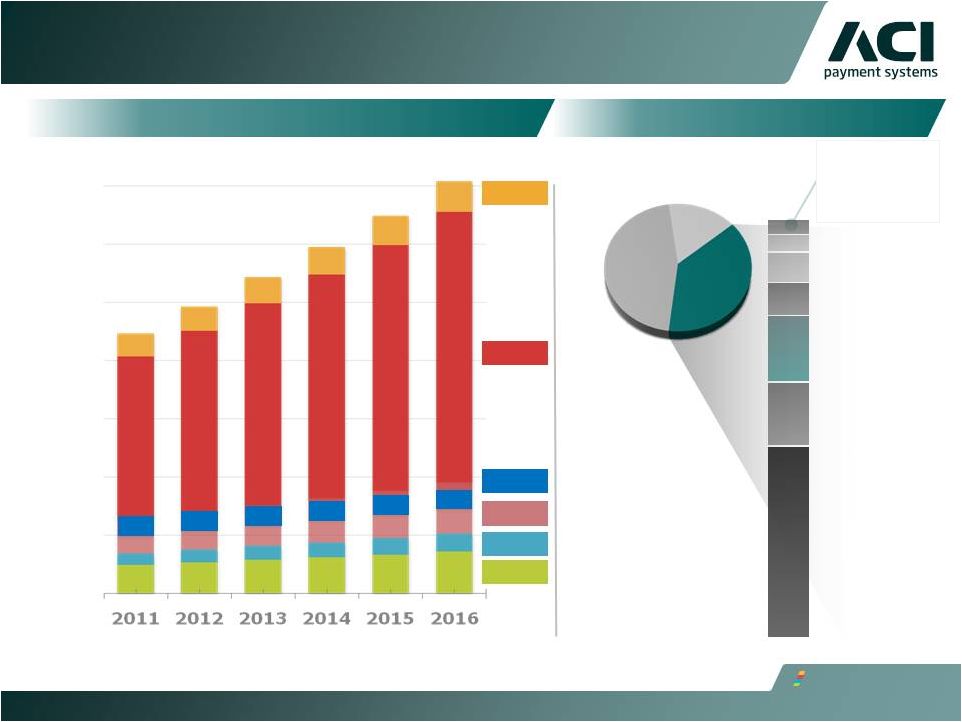 Large and Growing
Worldwide Payment Opportunity 7
Source: IDC Financial Insights 2011, ACI Internal Analysis
8,949
9,864
10,881
11,914
12,989
14,184
5.8%
10.6%
10.5%
10.2%
7.7%
7.2%
796
5,625
556
604
381
987
844
6,259
619
644
429
1,068
898
6,965
688
691
483
1,155
957
7,695
760
744
510
1,247
1,005
8,456
834
796
562
1,335
1,057
9,307
916
854
619
1,430
Retail Banking
Payments
Merchant Retailer
Payments
5YR CAGR (2011-16)=
9.6%
Wholesale Banking
Payments
Source: IDC Financial Insights, June 2011; Company reports and ACI analysis
BPO (e.g..
processors)
IT SERVICES
SOFTWARE
16%
38%
46%
OTHER
(Homegrown &
Regional)
IBM
ACI –
2011
Estimated Share of 8%
FAIR ISAAC (FICO)
INTUIT (Digital
Insights)
SAS
Tools and
Infrastructure
Online Banking and
Cash Management
Fraud Management
Note: ACI market share pro forma for S1 acquisition
2011 ESTIMATED SHARE
SERVICEABLE SOFTWARE
INDUSTRY SPEND IN 2016 = $14.2B
($ in millions)
FundTech
Bottomline
NICE (Actimize)
BAE (Norkom & Detica)
Clear2Pay
Dovetail
FIS |
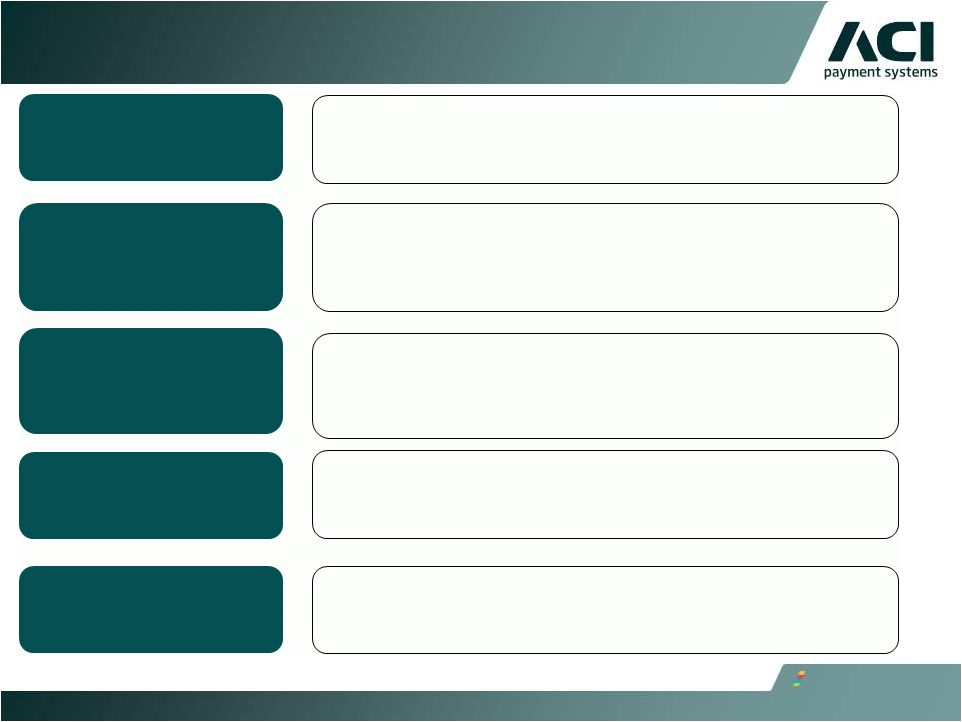 Customer
Trends 8
Continued Shift to
Electronic Payments
Customer Focus on
Improved Efficiency
and Risk
Management
Replacement of
Legacy Systems
Regulatory
Requirements
Financial Industry
Consolidation
•
Global retail and wholesale transaction volumes are expected to grow at a
9-10% CAGR through 2020
•
E-payments vendors are increasingly investing in robust, scalable
architecture with enhanced straight -through processing capabilities to
reduce errors and prevent fraud
•
Many large financial institutions process electronic payments on
legacy
software and systems developed by internal IT departments
•
Financial institutions will upgrade or replace their existing systems with the
robust, scalable solutions third-party vendors provide as industry IT
investment recovers
•
Dodd-Frank bill, Basel II and SEPA
•
Requirements to upgrade existing systems to manage enterprise risk and
reduce cross-border payments costs
•
Large financial institutions desire to simplify their vendor relationships
•
Vendors with a complete set of solutions across the enterprise are poised
to capitalize on their existing relationships for cross-selling opportunities
|
 ACI / S1
– Compelling Strategic Rationale
•
Closed the acquisition of S1 Corporation in February 2012
•
Combination
creates
an
industry
leader
in
financial
and
payments
software
serving financial institutions (“FI”), processors and merchant retailers
worldwide
•
Summary pro forma financials are compelling
–
Approximately $701 million in combined 2012E Revenue (1)
–
Approximately $168 million in combined 2012E Adj. EBITDA, including cost synergies (1)
–
Annual cost synergies of $30 million
•
Complementary products and customers expand breadth and features/functions
•
Enhanced global product capabilities to expand growth opportunities
•
Greater scale and cost synergies to drive margin expansion and earnings
accretion
9
Note:
(1) 2012E pro forma combined ACI + S1 financial results are before one-time transaction
expenses. |
 Financial
overview 10 |
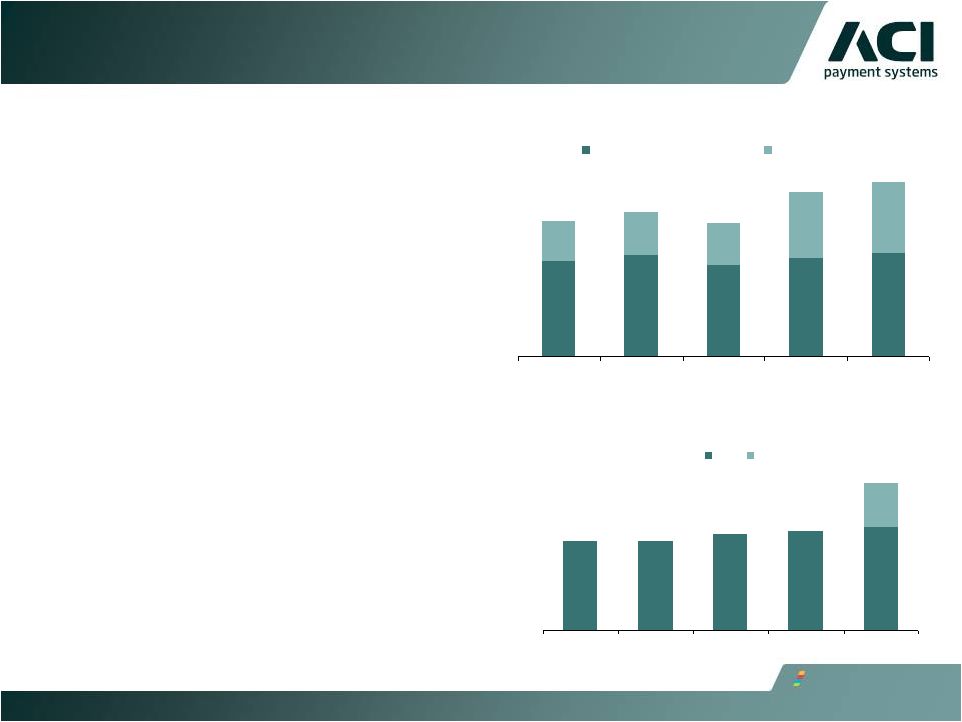 Sales and Revenue
Model •
New
Account
/
New
Product
Sales
–
revenue
generally split evenly among license, maintenance
and service
•
Term Extensions –
50% license, 50%
maintenance
•
99% of our organic contracts are fixed term, 5
years
•
95% of our contracts are Transaction Based (TBP)
•
Average initial license fee (ILF) is 25% to 35% of
total license fee value
•
40% to 50% of annual sales are derived from up-
selling existing customers (incremental capacity,
services and add-on modules)
•
Continued growth in backlog yields increased
forward revenue visibility
•
Higher margin recurring revenues (maintenance,
license and hosting fees) comprise majority of 60-
month backlog
•
Lower margin implementation services more
significant in first 12 months
•
Renewal rates across all products > 96% with
near zero attrition on BASE24 product line
11
Sales / Bookings
Historical 60-Month Backlog
(as of December 31
st
)
$1,388
$1,407
$1,517
$1,555
$2,302
$1,617
$685
2007
2008
2009
2010
PF 2011
ACI
S1
$323
$136
$433
$460
$425
$525
$556
$330
$315
$293
$304
$226
$210
$132
$130
2007
2008
2009
2010
2011
Sales, Net of Term Extensions
Term Extensions
($ in Millions) |
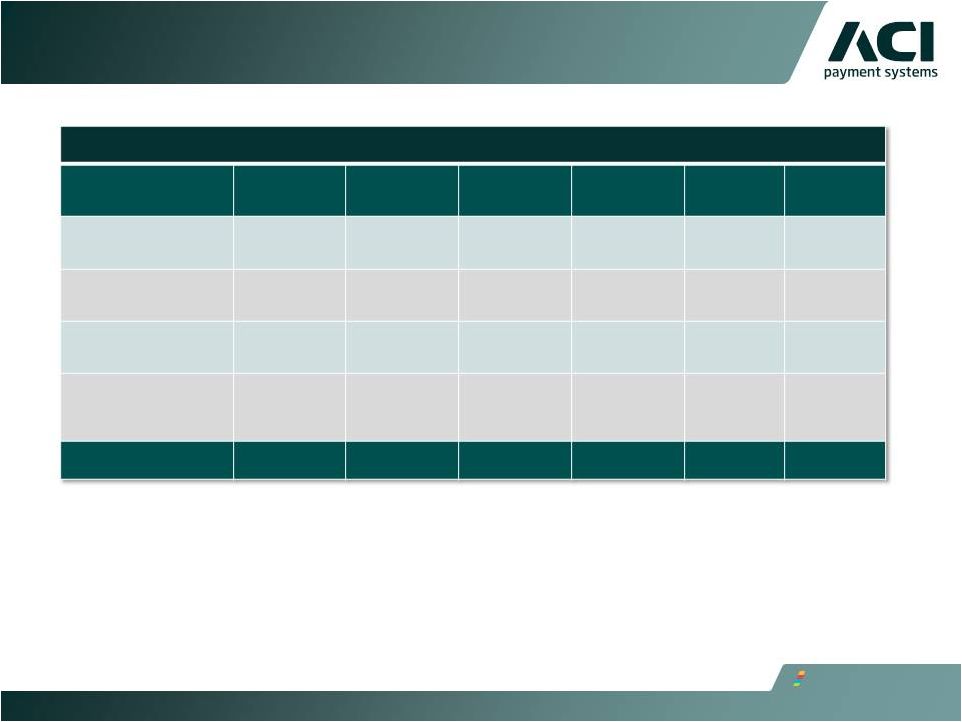 Revenue from
Backlog vs. Sales •
Backlog from monthly recurring revenues and project go-lives continues to drive annual
GAAP revenue, leading to more predictable performance and less reliance on current
period sales bookings to meet revenue targets
12
Revenue
Revenue ($M)
Yr Ended
Dec 07
Yr Ended
Dec 08
Yr Ended
Dec 09
Yr Ended
Dec 10
Yr Ended
Dec 11
Organic
2012G
Revenue from
Backlog
293
336
325
355
381
424
Revenue from
Backlog
78.0%
80.0%
80.0%
85.0%
82.0%
86.0%
Revenue from
Sales
81
82
81
63
84
71
Revenue from
Sales
22.0%
20.0%
20.0%
15.0%
18.0%
14.0%
Total Revenue
374
418
406
418
465
495 |
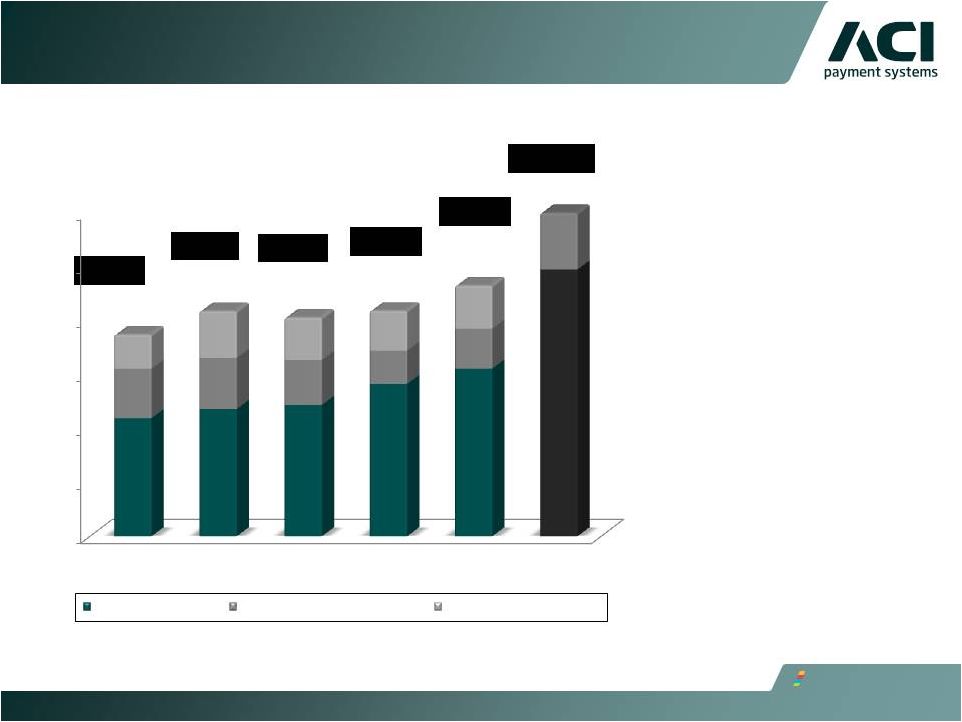 Calendar Year
Revenue Mix 13
$374
$418
$406
$465
$701
$418
Note: Amounts represent reported FX rates and are not reflective of FX movements between
reporting periods •
Improved monthly
recurring from 59% to
67% of annual revenue
•
Non-recurring license fees
include annual license fees
representing
approximately 5% of total
revenue resulting in
annual recurring revenue
in excess of 70%
•
Beginning contracted
backlog represents
approximately 85% of
forward revenue guidance
($ in Millions)
17%
24%
59%
20%
23%
57%
19%
21%
60%
17%
15%
68%
17%
16%
67%
0
100
200
300
400
500
600
CY 2007
CY 2008
CY 2009
CY 2010
CY 2011
CY 2012
Recurring Revenue
Non-Recurring License Fees
Non-Recurring Services |
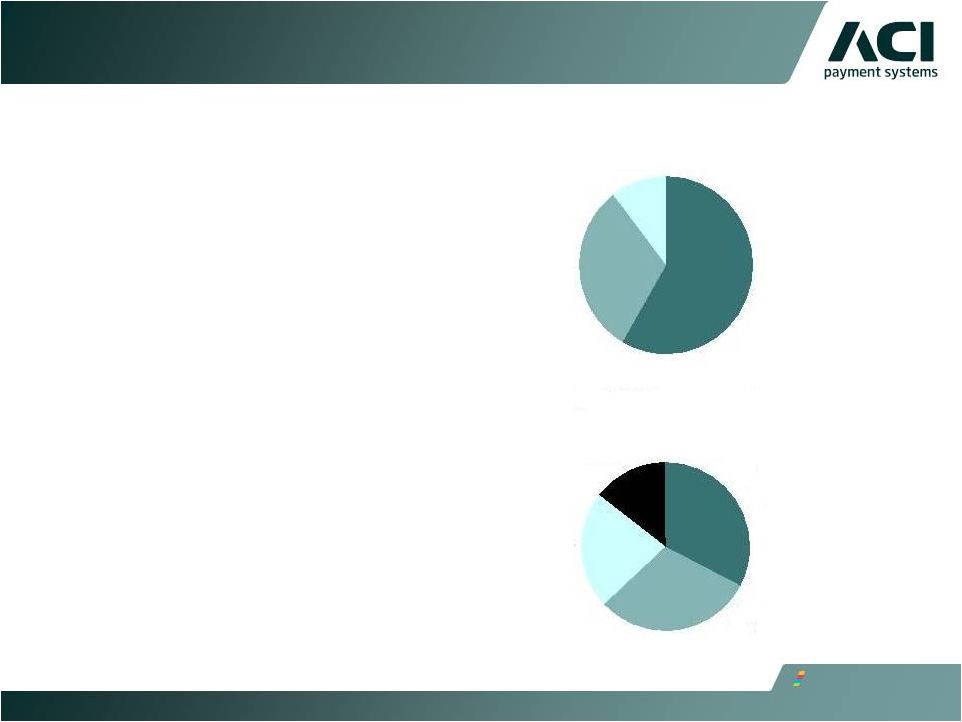 Diversified
Revenue Base by Geography and Type •
Diversified global company with
customers spanning ~ 80 countries
•
Approximately 75-80% of business
denominated in U.S. dollars in spite of
geographic scope
•
Higher margin recurring revenues
(maintenance, license and hosting fees)
comprise nearly 80% of revenue
•
Lower margin implementation services
represent approximately 20% of
revenue
Revenue by Region
Revenue by Type
Americas
58%
EMEA
31%
11%
Asia/ Pacific
Hosting
14%
Licenses
33%
Services
23%
Maintenance
30%
14 |
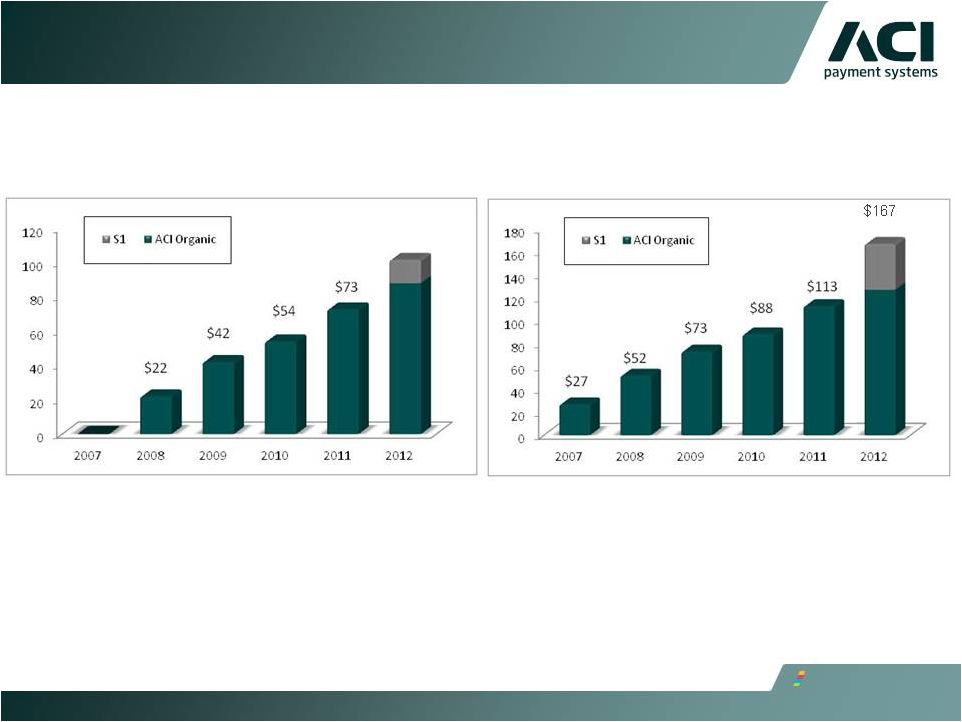 Operating Income
and Adjusted EBITDA 2007-2012 •
2011 and 2012 Operating Income and Adjusted EBITDA exclude one-time expenses
related to the acquisition of S1 Corporation but include impact of the $12 million
deferred revenue haircut
•
Stated
target
margins
of
>20%
operating
margin
and
>30%
Adjusted
EBITDA
over
planning horizon
15
Operating Income
Adjusted EBITDA
($ in Millions)
$101 |
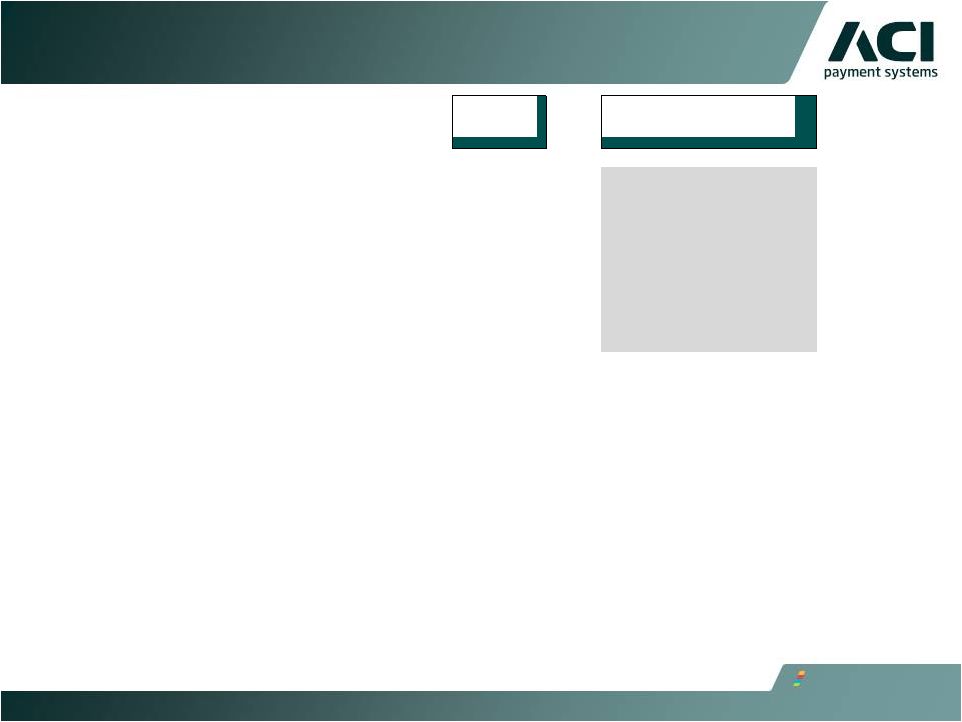   ACI / S1
– 2012 Guidance
•
ACI 2012E represents midpoint of organic Guidance
•
Combined Guidance before one-time transaction expenses:
–
Represents 10½
months of financial results of S1
–
State Farm custom project completed in 2011 (revenue of ~$17 million in 2011)
–
Includes annual cost synergies of $23 million to be realized in 2012
–
Includes estimates for non-cash purchase accounting adjustments (assumes deferred
revenue haircut of $12M)
•
Before purchase accounting, combined adjusted EBITDA margin in-line with ACI organic
margins •
Fully diluted shares outstanding of approximately 40 million at close
16
($ in Millions)
Standalone
ACI
Revenue
495
$
696
$
-
706
$
Adjusted EBITDA
127
$
165
$
-
170
$
Margin %
26%
24%
24%
Operating Income
87
$
99
$
-
104
$
Margin %
17%
14%
15%
Combined Guidance before
One-Time Trans. Exps. |
 Non-GAAP
Financial Measures ACI
includes
backlog
estimates
which
are
all
software
license
fees,
maintenance
fees
and
services
specified
in
executed
contracts,
as
well
as
revenues
from
assumed
contract
renewals
to
the
extent
that
we
believe
recognition
of
the
related
revenue
will
occur
within
the
corresponding
backlog
period.
We
have
historically
included
assumed
renewals
in
backlog
estimates
based
upon
automatic
renewal
provisions
in
the
executed
contract
and
our
historic
experience
with
customer
renewal
rates.
Backlog is considered a non-GAAP financial measure as defined by SEC Regulation G.
Our 60-month backlog estimate represents expected revenues from existing customers
using the following key assumptions:
•
Maintenance fees are assumed to exist for the duration of the license term for those contracts
in which the committed maintenance term is less than the committed license term.
•
License and facilities management arrangements are assumed to renew at the end of their
committed term at a rate consistent with our historical experiences.
•
Non-recurring license arrangements are assumed to renew as recurring
revenue streams.
•
Foreign currency exchange rates are assumed to remain constant over the 60-month backlog
period for those contracts stated in currencies other than the U.S. dollar.
•
Our pricing policies and practices are assumed to remain constant over the 60-month
backlog period. Estimates
of
future
financial
results
are
inherently
unreliable.
Our
backlog
estimates
requi
re
substantial
judgment
and
are
based
on
a
number
of
assumptions
as
described
above.
These
assumptions
may
turn
out
to
be
inaccurate
or
wrong,
including
for
reasons
outside
of
management’s
control.
17 |
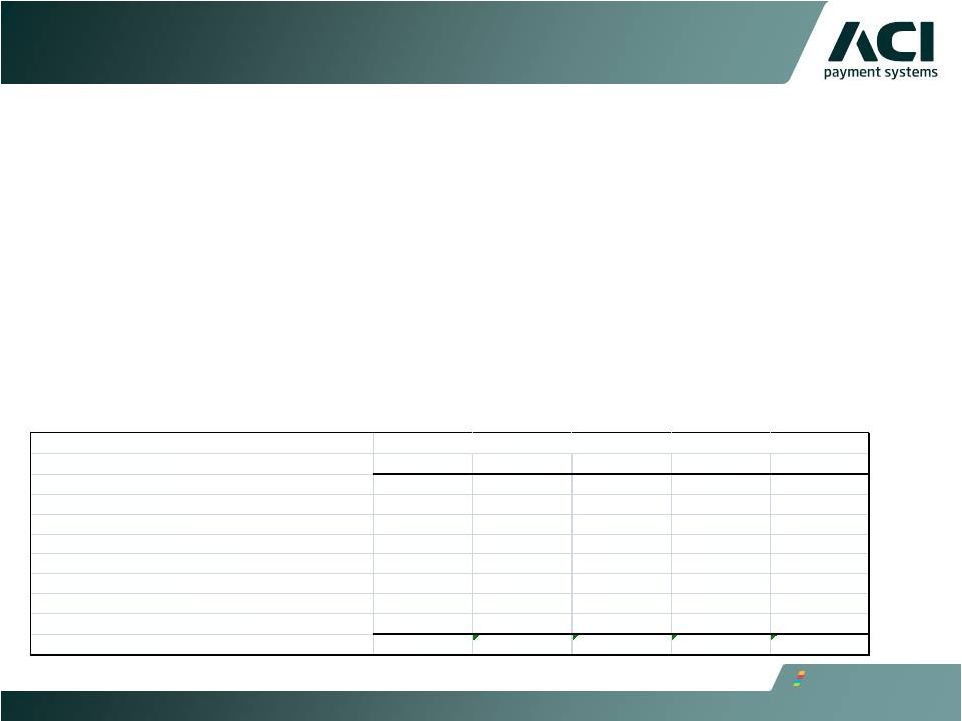 Non-GAAP
Financial Measures For example, our customers may attempt to renegotiate or
terminate their contracts for a number of reasons, including mergers, changes in their
financial condition, or general changes in economic conditions in the customer’s
industry or geographic location, or we may experience delays in the development or delivery of
products or services specified in customer contracts which may cause the actual renewal rates
and amounts to differ from historical experiences.
Changes in foreign currency exchange rates may also impact the amount of revenue actually
recognized in future periods. Accordingly, there can be no assurance that
contracts included in backlog estimates will actually generate
the
specified
revenues
or
that
the
actual
revenues
will
be
generated
within
the
corresponding
60-
month period. Backlog should be considered in addition to, rather than as a substitute for,
reported revenue and deferred revenue.
ACI also includes Adjusted EBITDA, which is defined as net income (loss) plus income tax
expense, net interest income (expense), net other income (expense), depreciation and
amortization and non-cash compensation.
Adjusted EBITDA is considered a non-GAAP financial measure as defined by SEC Regulation
G.
Adjusted EBITDA should be considered in addition to, rather than as a substitute for,
operating income (loss).
18
Adjusted EBITDA
(millions)
2011
2010
2009
2008
2007
Net income (loss)
$52.6
$27.2
$19.6
$10.6
($13.8)
Plus:
Income tax expense
18.5
21.5
13.5
17.0
7.7
Net interest expense
1.1
1.3
1.8
2.4
2.6
Net other expense (income)
0.8
3.6
6.6
(8.2)
3.8
Depreciation expense
7.5
6.7
6.3
6.5
6.0
Amortization expense
20.8
19.7
17.4
15.5
14.8
Non-cash compensation expense
11.3
7.8
7.6
7.9
5.8
Adjusted EBITDA
$112.6
$87.8
$72.8
$51.7
$26.9
Calendar Year Ended December 31, |
 Forward-Looking Statements
This presentation contains forward-looking statements based on current expectations that
involve a number of risks and uncertainties. Generally, forward-looking statements
do not relate strictly to historical or current facts and may include words or phrases
such as
“believes,”
“
will,”
“expects,”
“anticipates,”
“intends,”
and words and phrases of similar impact. The forward-looking statements
are made pursuant to safe harbor provisions of the Private Securities Litigation Reform Act
of 1995. Forward-looking statements in this presentation include, but are not
limited to, statements regarding: •
Expectations
and
assumptions
regarding
the
recent
acquisition
of
S1
relating
to
(i)
creating a
worldwide industry leader in financial and payments software serving FIs, processors and
merchant retailers, (ii) creating compelling pro forma financials, (iii) complementary
products and customers expand breadth and features/ functions, (iv) enhanced global
product capabilities to expand growth opportunities and (v) greater scale and cost
synergies to drive margin expansion and earnings accretion;
•
Expectations related to 2012 customer trends including expectations and assumptions regarding
(i) growth in global retail and wholesale transaction volumes, (ii) investment in
robust, scalable architecture with enhanced straight-through processing
capabilities to reduce errors and prevent fraud, (iii) replacement of existing systems
with robust, scalable third-party vendors, (iv) upgrade existing systems to manage
risk and reduce cross-border payments costs, (v) simplification of vendor
relationships and (vi) vendors poised to capitalize on existing customer relationships leading
to cross-selling opportunities;
•
The company’s 12-month and 60-month backlog estimates and assumptions, including
our belief that backlog from monthly recurring revenues and project go-lives will
continue to drive current quarter GAAP revenue and lead to predictable performance;
and •
Expectations and assumptions regarding (i) ACI/S1 combined 2012 financial guidance related to
revenue, operating income and adjusted EBITDA and (ii) expectations and assumptions
regarding other factors impacting our 2012 financial guidance.
19 |
 Forward-Looking Statements
All of the foregoing forward-looking statements are expressly qualified by the risk
factors discussed in our filings with the Securities and Exchange Commission. Such
factors include but are not limited to, risks related to the global financial crisis
and the continuing decline in the global economy; volatility and disruption
of
the
capital
and
credit
markets
and
adverse
changes
in
the
global
economy;
consolidations and failures in the financial services industry; increased competition;
restrictions and other financial covenants in our credit facility; the restatement of
our financial statements; the accuracy of management’s backlog estimates;
impairment of our goodwill or intangible assets; exposure to unknown tax liabilities;
risks from operating internationally; our offshore software development activities;
customer reluctance to switch to a new vendor; the performance of our strategic
product, BASE24-eps; our strategy to migrate customers to our next generation products;
ratable or deferred recognition of certain revenue associated with customer migrations and
the maturity of certain of our products; demand for our products; failure to obtain
renewals of customer contracts or to obtain such renewals on favorable terms; delay or
cancellation of customer projects or inaccurate project completion estimates; business
interruptions or failure of our information technology and communication systems; our
alliance with International Business Machines Corporation (“IBM”); the
complexity of our products and services and the risk that they may contain hidden
defects or be subjected to security breaches or viruses; compliance of our products
with applicable legislation, governmental regulations and industry standards; our
compliance with privacy regulations; the protection of our intellectual property in
intellectual property litigation; future acquisitions, strategic partnerships and
investments and litigation; the risk that expected synergies, operational efficiencies
and cost savings from our recent acquisition of S1 Corporation (“S1”) may not
be
fully
realized
or
realized
within
the
expected
timeframe;
the
cyclical
nature
of
our
revenue
and
earnings and the accuracy of forecasts due to the concentration of revenue generating
activity during the final weeks of each quarter; and volatility in our stock
price. For a detailed discussion of these risk factors, parties that are relying
on the forward-looking statements should review our filings with the Securities
and Exchange Commission, including our most recently filed Annual Report on Form 10-
K and subsequent reports on Forms 10-Q and 8-K.
20 |
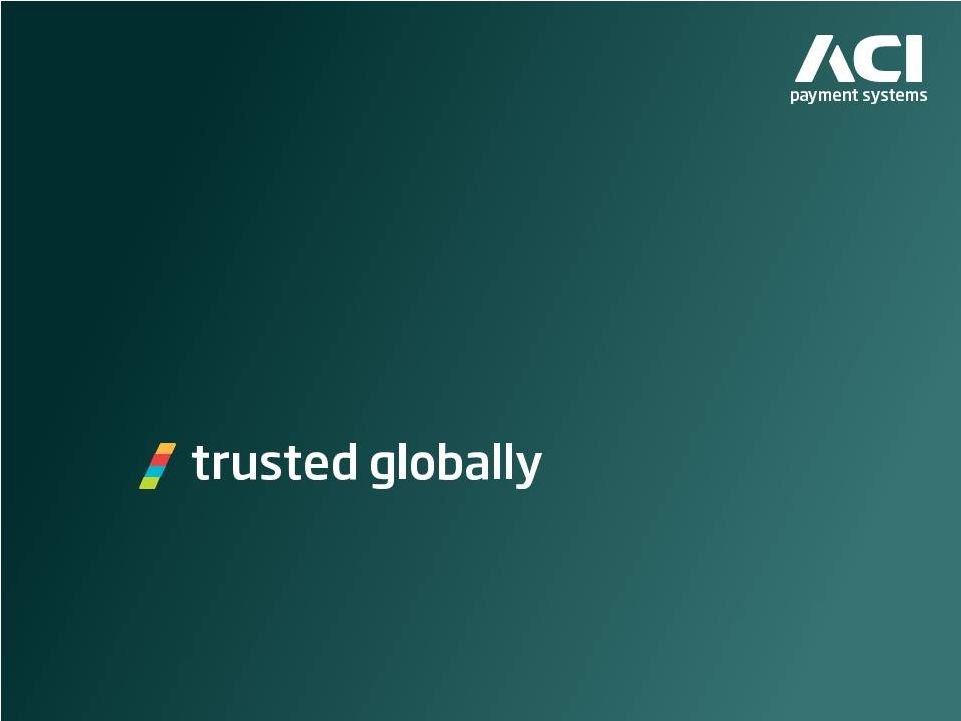 ACI’s
software underpins electronic payments throughout retail and
wholesale banking, and commerce all
the time, without fail.
www.aciworldwide.com |
